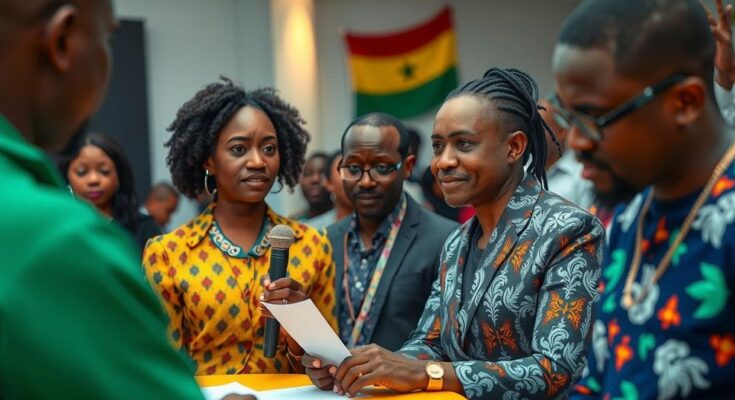Ghanaians will vote in pivotal presidential elections on Saturday, influenced by severe economic woes including rising inflation and unemployment. Candidates Mahamudu Bawumia and John Mahama represent contrasting visions for the country. The elections also highlight ongoing issues like illegal mining and public dissatisfaction with economic management. A crucial element will be ensuring a peaceful transition of power and adherence to democratic practices as outlined by historical precedents in Ghana’s electoral process.
Ghanaians are set to participate in presidential elections on Saturday amidst significant economic challenges, marking historically high stakes for the upcoming polls. Twelve candidates are competing for the presidency, particularly two leading contenders: the current Vice President Mahamudu Bawumia of the New Patriotic Party (NPP) and former President John Mahama of the National Democratic Congress (NDC). Current economic distress, manifested in soaring inflation and widespread unemployment, shapes the voters’ preferences and opinion polls demonstrating a near tie between the two prominent figures.
The economy remains a pivotal issue, with voters expressing concerns regarding rising poverty and joblessness fueled by the country’s worst economic performance in decades. International reports indicate that Ghana has experienced a surge in inflation rates, with figures reaching over 54% in late 2022, exacerbating living conditions and prompting public discontent towards the ruling class. Economists assert that the state of the economy is influencing voter sentiment, suggesting that had economic conditions been favorable, the ruling party might have had a better chance in these elections.
Further complicating the electoral landscape is a long-standing crisis associated with illegal gold mining, known locally as “galamsey,” which has created environmental havoc and impacted livelihoods. Both presidential hopefuls are presenting diverging visions for Ghana’s future, with Mahama focusing on good governance and accountability while Bawumia emphasizes economic stabilization and infrastructure development. Policymakers and analysts alike express an expectation for a closely contested election, underscored by Ghana’s established tradition of democratic transitions and a hopeful public eagerly seeking change.
The context surrounding the upcoming elections in Ghana involves severe economic difficulties that the nation has been grappling with, including high inflation, unemployment rates, and environmental challenges associated with illegal mining activities. The electoral significance is compounded by the fact that the incumbent president, Nana Akufo-Addo, is unable to seek re-election due to presidential term limits. Recent history demonstrates a critical public sentiment as citizens demand tangible improvements in governance, economic stability, and accountability. Former President John Mahama’s bid for re-election echoes a similar comeback strategy observed in U.S. politics, specifically reflecting on Donald Trump’s resurgence.
In conclusion, the impending election in Ghana represents a crucial opportunity for citizens to exercise their democratic rights while addressing pressing economic challenges. With key issues such as inflation, unemployment, and corruption at the forefront, voters are tasked with making pivotal choices that could reshape the country’s future. Both Mahama and Bawumia offer contrasting visions for governance, yet all eyes remain on the electorate’s response to the frustrations exerted by ongoing economic difficulties. The nation seeks a peaceful election, reinforcing Ghana’s commitment to democratic principles and a better economic landscape for its citizens.
Original Source: www.cnn.com




